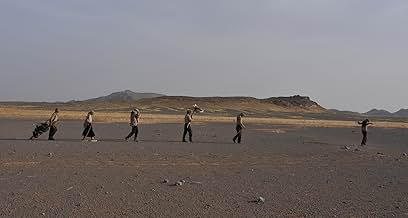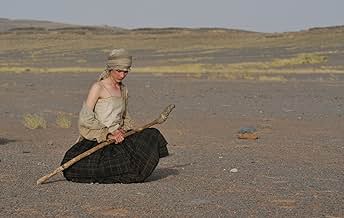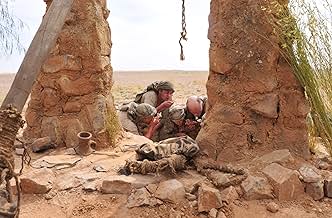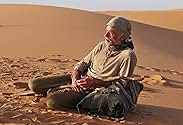Les évadés du goulag sibérien parcourent 6 000 kilomètres à pied pour trouver la liberté en Inde.Les évadés du goulag sibérien parcourent 6 000 kilomètres à pied pour trouver la liberté en Inde.Les évadés du goulag sibérien parcourent 6 000 kilomètres à pied pour trouver la liberté en Inde.
- Réalisation
- Scénario
- Casting principal
- Nommé pour 1 Oscar
- 4 victoires et 5 nominations au total
Gustaf Skarsgård
- Voss
- (as Gustaf Skarsgard)
Zachary Baharov
- Interrogator
- (as Zahari Baharov)
Sally Brunski
- Janusz's Wife, 1939
- (as Sally Edwards)
Dejan Angelov
- Andrei
- (as Deyan Angelov)
Mariy Rosen
- Lazar
- (as Marii Grigorov)
Nikolay Stanoev
- Yuri
- (as Nikolai Stanoev)
Avis à la une
I went with my friends to see this the other day - we picked whatever film was on soonest at the cinema. The Way Back was on...and we went in. I had no idea what the film was about only that I'd heard that "People walk out of Russia".
This film really had you captivated for the entire journey - and you really connect with the characters within it, so much so you experience their emotions with them - you laugh with them, you are on the verge of tears at moments, and you feel their determination.
The acting was great - there were some familiar faces in the likes of Jim Sturgess (21) and Ed Harris (everything else)...and they do very well in their roles. Colin Farrell finds himself taking a respectable role in a respectable film - and does a very good job at it - and even manages to work a Russian accent, which he pulls off - and he pulls it off well. Surprisingly well, actually! Saoirse Ronan, at 15/16, is incredible in this. Given her youth, she manages to draw in the audience with her character's history and gravitas. The other actors within this, despite them being relatively unknown on the Hollywood stage, join the cast well, and the chemistry is there to make the journey and the true stamina of the group believable.
The cinematography was immense, with shots overlooking parts of Russia, Mongolia, Tibet, and India - just helps you realise the vastness of the journey. Most of the journey is filmed looking closely at the characters, but this is what is crucial to the audience enjoying the story. You can't have 2hrs and 13 mins of beautiful scenery and see the intimate struggles with each of the characters...therefore the director does well to mix the two. The audience can see just what the struggles and difficulties are...but are treated to some amazing shots of the scenery, which make you realise how incredible this journey was. (I even got a map out later and routed the journey they took)
I should expect that this film would receive some Oscar nominations, maybe for cinematography, director, perhaps even best picture, but I would love to see Jim Sturgess having a nomination for his role.
This film really had you captivated for the entire journey - and you really connect with the characters within it, so much so you experience their emotions with them - you laugh with them, you are on the verge of tears at moments, and you feel their determination.
The acting was great - there were some familiar faces in the likes of Jim Sturgess (21) and Ed Harris (everything else)...and they do very well in their roles. Colin Farrell finds himself taking a respectable role in a respectable film - and does a very good job at it - and even manages to work a Russian accent, which he pulls off - and he pulls it off well. Surprisingly well, actually! Saoirse Ronan, at 15/16, is incredible in this. Given her youth, she manages to draw in the audience with her character's history and gravitas. The other actors within this, despite them being relatively unknown on the Hollywood stage, join the cast well, and the chemistry is there to make the journey and the true stamina of the group believable.
The cinematography was immense, with shots overlooking parts of Russia, Mongolia, Tibet, and India - just helps you realise the vastness of the journey. Most of the journey is filmed looking closely at the characters, but this is what is crucial to the audience enjoying the story. You can't have 2hrs and 13 mins of beautiful scenery and see the intimate struggles with each of the characters...therefore the director does well to mix the two. The audience can see just what the struggles and difficulties are...but are treated to some amazing shots of the scenery, which make you realise how incredible this journey was. (I even got a map out later and routed the journey they took)
I should expect that this film would receive some Oscar nominations, maybe for cinematography, director, perhaps even best picture, but I would love to see Jim Sturgess having a nomination for his role.
The story of a small group of people escaping from a Siberian Soviet prison, part of the "Gulag" in wartime and walking 4000 miles to freedom looked a trifle grim in the trailer, but Peter Weir has managed to produce a rather beautiful film out of it, using Bulgaria and Morocco as locales rather than Siberia and the Gobi desert. Only Darjeeling in India plays itself. My only trouble with it is the rather uneven character development. The story lends itself to ensemble playing but we learn little about two or three of the walkers. In the case of the lead character Janusz (Jim Sturgess) who is the source of the story this is explicable as we are seeing the others though his eyes, but it has to be said that both "Mr Smith" (the excellent Ed Harris) and the Girl (Saiorse Ronan) leave a lasting impression.
I know there is some doubt as to the authenticity of the story, taken from a 1955 book by Slavimir Rawicz a former Polish army officer, and indeed what the group are supposed to have done looks impossible but that's not a problem, because the relationships ring true. It is remarkable how an almost random collection of individuals, including one with a very unsavoury past, can, driven by sheer necessity, wind up functioning as a team. Partly this is due to the leader actually having some navigational knowledge and therefore inspiring confidence in the others. Mr Smith remarks early on that the Janusz has a serious weakness; he is kind, but when the chips are down we see that even the hard-bitten Mr Smith is capable of compassion.
Strangely enough, after the initial scenes in the prison camp, and the escape, there is not a lot of drama. The group encounter very few people on their travels and those they do meet take little interest in them (perhaps they had not heard about the bounty for escapees). Obtaining food and water is obviously a big issue, so mind out for the messy hunting scenes. I was astounded at how well their footwear stood up to the punishment; my hiking boots are not good for 400 miles let alone 4000. Actually they must have wandered around a bit - the northern end of Lake Baikal and Lhasa in Tibet are about 1800 miles apart, though the prison camp was somewhere north of the lake. It's also not clear how long the walk took, but at times it seemed like years. Weir's great achievement is to keep us watching a very drawn out tale. Personally I think I would have died of boredom if I had been in this particular walk, if starvation hadn't got me first.
I know there is some doubt as to the authenticity of the story, taken from a 1955 book by Slavimir Rawicz a former Polish army officer, and indeed what the group are supposed to have done looks impossible but that's not a problem, because the relationships ring true. It is remarkable how an almost random collection of individuals, including one with a very unsavoury past, can, driven by sheer necessity, wind up functioning as a team. Partly this is due to the leader actually having some navigational knowledge and therefore inspiring confidence in the others. Mr Smith remarks early on that the Janusz has a serious weakness; he is kind, but when the chips are down we see that even the hard-bitten Mr Smith is capable of compassion.
Strangely enough, after the initial scenes in the prison camp, and the escape, there is not a lot of drama. The group encounter very few people on their travels and those they do meet take little interest in them (perhaps they had not heard about the bounty for escapees). Obtaining food and water is obviously a big issue, so mind out for the messy hunting scenes. I was astounded at how well their footwear stood up to the punishment; my hiking boots are not good for 400 miles let alone 4000. Actually they must have wandered around a bit - the northern end of Lake Baikal and Lhasa in Tibet are about 1800 miles apart, though the prison camp was somewhere north of the lake. It's also not clear how long the walk took, but at times it seemed like years. Weir's great achievement is to keep us watching a very drawn out tale. Personally I think I would have died of boredom if I had been in this particular walk, if starvation hadn't got me first.
I think it's always difficult to portray hardship and endurance in films purely because you only experience it for a couple of hours or so. This had me understanding the terrible conditions for real....i think. The search for water in the Gobi desert had me thinking twice about attempting the same thing as a holiday. Make up was fantastic and the bleakness of the scenery was soo beautiful
Having read several books about escapes from Siberia, I was interested in seeing one of them put on screen. I say this because the film is a bit slow in a number of parts so it helps to have a great interest in the subject matter. The film isn't boring - at least, to me - but I can see some people seeing it that way, especially if you're used to today's action movies.
The scenery is magnificent and some of the shots by director Peter Weir are jaw-dropping. This is Weir's first film since the 2003 "Master And Commander: The Far Side Of The World." The man does quality work.
Ed Harris one of the few, if not only, actors in here whose English you can clearly understand, so it's a good idea to play this DVD with subtitles. You get a fair of amount of subtitles with the Russian characters, anyway, but none are distracting from the scenery or story. The characters and acting in here are good, too.
If this subject matter interests you, find the book, "As Far As My Feet Will Carry Me," about a one-man escape from a Siberian Labor Camp following WWII.
The scenery is magnificent and some of the shots by director Peter Weir are jaw-dropping. This is Weir's first film since the 2003 "Master And Commander: The Far Side Of The World." The man does quality work.
Ed Harris one of the few, if not only, actors in here whose English you can clearly understand, so it's a good idea to play this DVD with subtitles. You get a fair of amount of subtitles with the Russian characters, anyway, but none are distracting from the scenery or story. The characters and acting in here are good, too.
If this subject matter interests you, find the book, "As Far As My Feet Will Carry Me," about a one-man escape from a Siberian Labor Camp following WWII.
This is a film for people who appreciate epic landscapes and survivor stories. It has some engaging characters but not brilliant dialogue or complicated characters. Mostly, it is a visual film, displaying the vulnerability of a few people in a harsh, vast, beautiful landscape. They must depend on each other, and they develop an intimacy based on their shared struggle rather than on deep conversations and emotional revelations, or at least, not until a young girl joins them. Weir seems to be commenting on the yin yang of masculinity/femininity at times in this film. I also liked the subtle underlying commentary on the brutal oppression of the Soviet regime under Stalin.
All of the actors were good; Farrell adds a touch of humor, Sturgess portrays anguish well, and Harris is a good tough old guy--his usual persona. By the way, Manohla Dargis in The New York Times complains that Farrell is too good-looking to be a Russian gangster. What this assessment is based on I can't imagine; doubt Dargis hangs with Russian gangsters.
All of the actors were good; Farrell adds a touch of humor, Sturgess portrays anguish well, and Harris is a good tough old guy--his usual persona. By the way, Manohla Dargis in The New York Times complains that Farrell is too good-looking to be a Russian gangster. What this assessment is based on I can't imagine; doubt Dargis hangs with Russian gangsters.
Le saviez-vous
- AnecdotesThis movie was inspired by the memoir of Slavomir Rawicz depicting his escape from a Siberian gulag and subsequent four thousand-mile walk to freedom in India. Incredibly popular, it sold over five hundred thousand copies, and is credited with inspiring many explorers. However, in 2006, the BBC unearthed records (including some written by Rawicz) that showed he had been released by the U.S.S.R. in 1942. In 2009, another former Polish soldier, Witold Glinski, claimed that the book was really an account of his own escape. However, this claim too has been seriously challenged.
- GaffesJanusz demonstrates a method using shadows of a stick and rock to find the compass direction of south. Yet, many of the scenes show them walking in a direction inconsistent with sun angles i.e. sun at their backs, which would have them walking north.
- ConnexionsFeatured in Breakfast: Épisode datant du 7 décembre 2010 (2010)
Meilleurs choix
Connectez-vous pour évaluer et suivre la liste de favoris afin de recevoir des recommandations personnalisées
Détails
- Date de sortie
- Pays d’origine
- Langues
- Aussi connu sous le nom de
- Camino a la libertad
- Lieux de tournage
- Sociétés de production
- Voir plus de crédits d'entreprise sur IMDbPro
Box-office
- Budget
- 30 000 000 $US (estimé)
- Montant brut aux États-Unis et au Canada
- 2 701 859 $US
- Week-end de sortie aux États-Unis et au Canada
- 1 218 868 $US
- 23 janv. 2011
- Montant brut mondial
- 24 172 201 $US
- Durée2 heures 13 minutes
- Couleur
- Mixage
- Rapport de forme
- 2.35 : 1
Contribuer à cette page
Suggérer une modification ou ajouter du contenu manquant

Lacune principale
What is the Japanese language plot outline for Les chemins de la liberté (2010)?
Répondre




































